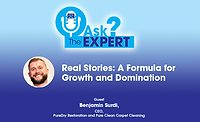Winning with Workers: How today’s Leaders Attract and Retain Top Restorers
The Formula for a Sustainable Workforce: Curiosity, Care, and Commitment
.jpg?1724156065)
A sustainable workforce can maintain long-term productivity and even thrive without experiencing burnout or excessive turnover. For Tony Scott, CEO of Pro-Claim Group, a member of the GUS network, it's characterized by a team that feels valued, supported, and engaged in their work, even in the face of industry challenges. In a field known for its high stress, creating a sustainable workforce can give companies a competitive edge in attracting and retaining top talent, while also fostering a more resilient and adaptable organization capable of weathering uncertainty.
Long-term success in restoration, from Tony’s perspective, is not about avoiding stress but managing it in a way that fosters growth. “It’s not terrible to work hard. It’s not terrible to accomplish something big and feel great about it. That’s what we want to do,” he emphasizes, working with his team to balance unavoidable stress with proactive, supportive practices. Tony’s approach to leadership is rooted in recognizing that stress is an inherent part of the restoration industry, akin to the high-stakes demands faced by first responders like police officers and firefighters. “We respond to emergencies,” Tony explains. “We like to call ourselves second responders. So like a fireman or a policeman, they're first, but we're right behind. So, by its very nature, we have similar stresses.” Tony balances this stress in a multi-faceted way, utilizing his curiosity, care, and commitment to helping others.
Welcome back to “Winning with Workers,” the KnowHow series that delves into the strategies successful leaders use to attract and retain top talent in the restoration industry. This month, we’re wrapping up with Tony Scott and his approach to sustainable work.
As we conclude our series on "Winning With Workers," we want to express our heartfelt gratitude to all our readers who have joined us on this journey through the principles of attracting and retaining top talent in the restoration industry. This final interview, featuring insights from Tony Scott, encapsulates many key themes we've explored throughout the series. As you read on, consider how these principles might apply to your own organization. And remember, this is just a taste of what's to come from KnowHow. We'll be back soon with more knowledge and tools to help your workforce succeed, now and in the future.
Curiosity: Building a Career in Restoration, and a Business
Tony Scott’s tenure in the restoration industry spans four decades, beginning as a summer worker and becoming a business owner by the age of 26. Curiosity has been a driving force throughout his career, from his early days in the restoration industry to his current role as CEO of the Pro-Claim Group in Vancouver, Canada.
An avid reader from a young age, Tony has long been curious about people and how to help them, which has carried through to his research-informed approach to management. He notes a pivotal point in his journey as a leader was when he became a parent: “There are certain principles in [parent-child psychology] that I really loved, that I felt really applied to the work and the team.” Adding that how you want to raise your kids might be similar to how you wish to raise employees, doing the best for them and seeing them succeed.
Tony’s curiosity extends beyond just people—it’s about learning continuously and applying new knowledge to his business. This mindset encourages a culture where curiosity is valued, and continuous learning is a norm.
- Encourage continuous learning: Foster an environment where curiosity is rewarded. Provide resources and opportunities for employees to expand their knowledge and skills.
- Apply personal experiences to leadership: Reflect on personal experiences, like parenting, and how they can inform your approach to managing and developing your team.
- Promote research-informed decision-making: Stay curious about new ideas and trends in your industry, and apply research-based strategies to your business practices.
Care: Nurturing a Supportive Work Environment
Tony's leadership style is characterized by genuine care for his employees. He believes in creating a work environment where people feel valued and supported, both professionally and personally. “Get to know them. Understand what they want to do with their life, and take an interest in it,” he advises. This investment in people is not just about retention—it’s about building a team that is aligned, motivated, and ready to tackle the challenges of the restoration industry.
At Pro-Claim Group, they say leaders should connect before they direct, getting to know how an individual is doing before jumping into a conversation. This approach creates a foundation of trust and empathy, which is crucial for effective communication and collaboration. By taking the time to check in with employees on a personal level, leaders can gauge their team's morale, address any concerns, and provide the necessary support to ensure everyone is in the right mindset to tackle the day's challenges.
When it comes to team alignment in the long term, Tony credits their clear vision: “We have a very clear vision of what we're doing and why. We are, as you probably know, huge on recycling and caring about the planet. We are in our community, we do big things all the time, we clean up the river. We're about a lot of stuff that is really good. And it happens that the younger generation, especially Gen Z and Millennials as well, they all come in and they love that. That's why they come to work here.”
By focusing on intrinsic motivators—such as the satisfaction of helping others and the pride in a job well done—Tony has built a culture where employees are driven by more than just a paycheck.
Tony’s vision isn’t just about the work itself but about creating a culture that values connection, trust, and shared purpose.
- Align work with values: Ensure your company’s vision and values resonate with your employees, particularly around community involvement and environmental responsibility.
- Connect before directing: Prioritize personal check-ins before diving into work-related discussions to build trust and understanding.
- Invest in individual growth: Take time to understand each employee's personal and professional goals, and provide the support they need to achieve them.
Commitment: Building Long-Term Success Through People
Instead of seeing staff’s income as a motivator, Tony takes a different approach. He and his team noted that money is a significant stressor, and they wanted to ease that burden for their team. That’s why, unlike many companies that rely on commissions and bonuses, Pro-Claim Group focuses on providing stable, predictable pay without the pressure of variable compensation. This approach reduces financial stress and unethical behavior that might arise from desperation.
For example, during the COVID-19 pandemic, he assured his employees that their salaries would remain unaffected, thereby removing the financial anxiety and allowing them to focus on their roles. This was not a small decision nor an easy one, but it clearly demonstrated their dedication to staff well-being and strengthened their loyalty and trust in the organization during a challenging time.
Tony’s commitment goes beyond financial security; it’s about long-term growth and involvement in decision-making. He engages his team in important decisions and provides opportunities for personal and professional development, ensuring they feel valued and motivated.
- Provide financial stability: Offer predictable and stable compensation to reduce financial stress and avoid unethical behavior.
- Demonstrate loyalty during tough times: Reassure your team during crises by maintaining their financial security and job stability.
- Involve employees in decision-making: Engage your team in important business decisions to foster a sense of ownership and commitment to the company’s success.
Key Takeaways for a Sustainable Approach to Leadership
Tony Scott's philosophy, grounded in curiosity, care, and commitment, offers a blueprint for creating a sustainable and thriving work environment in the challenging field of restoration. Here are a few actionable steps we’d recommend to manage stress and improve staff well-being:
- Define and communicate your company’s core values. Ensure that every employee understands and aligns with these values from day one.
- Focus on intrinsic motivators. Create an environment where employees see the direct impact of their efforts, fostering a deeper connection to their roles.
- Monitor and understand stress levels. Tony’s approach involves regular check-ins with his team, not just asking how they’re doing, but delving deeper into their well-being.
- Balance challenges with recognition. Ensure that hard work is acknowledged and that employees feel supported in their efforts.
- Invest time in understanding your employees. Take an active interest in their goals and aspirations, and support them in their journey.
While this marks the end of our deep dive into "Winning With Workers," we're excited about the new insights we'll be sharing with the R&R community soon. Stay tuned for more valuable content, fresh perspectives, and innovative strategies to help you excel in the ever-evolving world of restoration.
To hear more from Tony Scott and other industry leaders, head to tryknowhow.com/podcast or check out his interview on YouTube here.
Looking for a reprint of this article?
From high-res PDFs to custom plaques, order your copy today!







